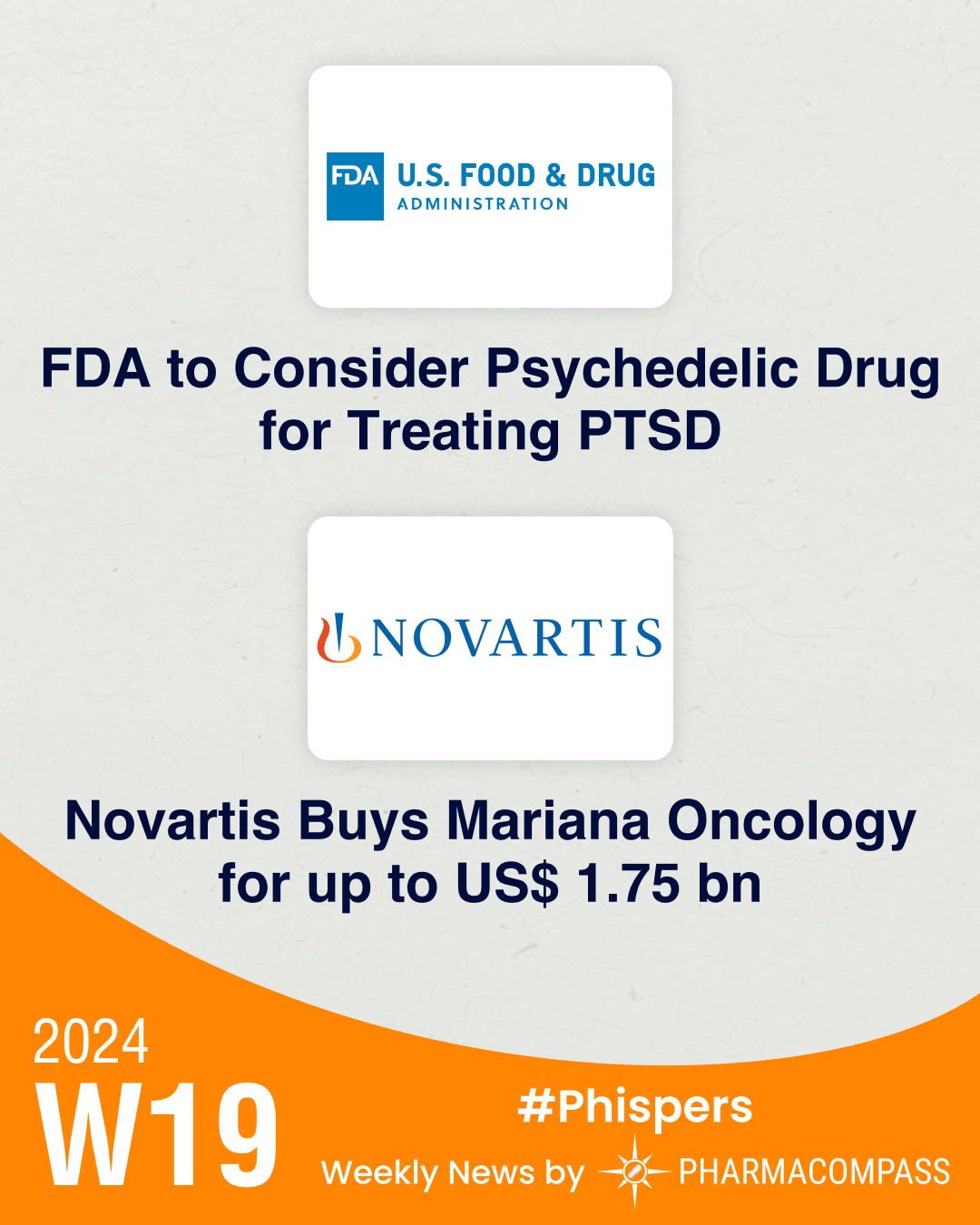
By PharmaCompass
2024-05-09
Impressions: 805 (Article) || 3 (Video)
Last year, the US Food and Drug Administration (FDA) had published a new draft guidance for researchers investigating the use of psychedelic drugs for potential treatment of psychiatric disorders. This week, the agency took a major step in that direction by announcing that its panel of independent advisers will deliberate on June 4 on whether it should recommend approving the first midomafetamine-assisted therapy for post-traumatic stress disorder (PTSD). Midomafetamine or MDMA is a psychedelic, commonly known as ecstasy.
In deals, Novartis has acquired Massachusetts-based radioligand therapy developer Mariana Oncology for an upfront payment of US$ 1 billion plus US$ 750 million in additional milestone payments.
After much delay, FDA has announced that its panel of independent advisers will discuss Eli Lilly’s experimental Alzheimer’s disease drug donanemab on June 10.
In trials, Regeneron’s investigational gene therapy (DB-OTO) dramatically improved hearing to normal levels in a child with profound genetic deafness within 24 weeks. Pfizer’s mid-stage trial of its experimental gene therapy to treat Duchenne muscular dystrophy (DMD) took a tragic twist when a young patient died. And AstraZeneca clinched a late-stage win for Calquence in untreated mantle cell lymphoma. Meanwhile, Pfizer has agreed to settle over 10,000 lawsuits pertaining to cancer risks concerning the now discontinued heartburn drug Zantac.
After over three billion doses, the Oxford-AstraZeneca Covid vaccine is being withdrawn worldwide. And in compliance news, Indian drugmaker Zydus Lifesciences got issued a second Form 483 in one month.
Novartis dishes out US$ 1.75 bn for Mariana to strengthen radioligand med pipeline
Novartis has agreed to buy Massachusetts-based Mariana Oncology for an upfront payment of US$ 1 billion plus US$ 750 million in additional milestone payments. Preclinical-stage biotech Mariana focuses on developing novel radioligand therapies (RLTs) to treat cancers with high unmet need. The acquisition encompasses a robust portfolio of RLT programs spanning lead optimization to early development across a range of solid tumor indications such as breast, prostate and lung cancer. RLTs are a form of precision medicine that combines a tumor-targeting molecule (ligand) with a therapeutic radioisotope (a radioactive particle). This targeted approach enables the delivery of radiation to the tumor, while limiting damage to the surrounding cells.
In a first, FDA panel to consider psychedelic-assisted therapy for PTSD
FDA’s panel of independent advisers will deliberate on June 4 to discuss whether it should recommend approving the first MDMA-assisted therapy for PTSD, said Lykos Therapeutics, a drugmaker working in the mental healthcare space. MDMA (or midomafetamine) is a psychedelic, commonly known as ecstasy. This will be the first FDA advisory committee meeting to review a potential new PTSD treatment in 25 years.
PTSD is a mental health condition triggered by a terrifying event. For long, mental health researchers have been captivated by psychoactive ingredients found in cannabis and LSD. A number of companies are testing such drugs to find cures for a range of mental health disorders.
Meanwhile, a London-based biotech — Compass Pathways — has announced top-line results from a phase 2 study evaluating the safety and tolerability of an investigational psilocybin treatment (COMP360) in 22 patients with PTSD. The study met its primary safety endpoint and available secondary efficacy endpoints. Psilocybin is a naturally occurring psychedelic compound.
Panel to meet on June 10 to discuss Lilly’s donanemab: On June 10, FDA’s panel of independent advisers will discuss Eli Lilly’s experimental Alzheimer's drug donanemab. The drug was declined accelerated approval in January 2023. If approved, it will compete with Eisai and Biogen’s Leqembi (lecanemab-irmb), which saw FDA approval last year.
AstraZeneca to withdraw Covid vaccines globally, cites surplus of newer vaccines
AstraZeneca has said it has begun a worldwide withdrawal of its Covid vaccine — Vaxzevria, also sold as Covishield — due to the surplus availability of other updated vaccines. Astra denied the decision had anything to do with the claim that the vaccine caused unusual blood clots, which were sometimes fatal. This easy to store vaccine was once heralded as “a vaccine for the world.” “As multiple, variant Covid-19 vaccines have since been developed there is a surplus of available updated vaccines,” the company said.
Pfizer reports patient death in phase 2 study on DMD: A young patient died from cardiac arrest after receiving Pfizer’s experimental gene therapy as part of a mid-stage trial for the muscle-wasting disorder Duchenne muscular dystrophy (DMD), the company said. The patient received the investigational gene therapy, fordadistrogene movaparvovec, in early 2023. Pfizer is in the process of reviewing the data to understand the potential cause.
Meanwhile, the drug behemoth has agreed to settle over 10,000 lawsuits pertaining to cancer risks concerning the now discontinued heartburn drug Zantac, a Bloomberg News report said.
Astra clinches late-stage win for Calquence in untreated mantle cell lymphoma
In a phase 3 study, AstraZeneca’s Calquence (acalabrutinib) in combination with standard-of-care chemoimmunotherapy, bendamustine and rituximab, demonstrated a statistically significant and clinically meaningful improvement in progression-free survival (PFS) as compared to standard of care in previously untreated adult patients with mantle cell lymphoma (MCL). While this came from interim analysis, it renders Calquence the first BTK inhibitor to show a favorable trend in overall survival versus standard-of-care chemoimmunotherapy in previously untreated MCL.
Regeneron’s gene therapy ‘dramatically’ improves hearing in kids
Regeneron Pharmaceuticals’ investigational gene therapy DB-OTO dramatically improved hearing to normal levels in a child with profound genetic deafness within 24 weeks in phase 1/2 trial. The child, the youngest in the world to receive a gene therapy for genetic deafness, was dosed at 11 months of age. In a second child, dosed at four years of age, initial hearing improvements were observed at six weeks.
Zydus’ Gujarat plant hit with Form 483 with 10 observations
Zydus Lifesciences has received its second Form 483 within a span of one month. Following an inspection at the company’s site in the Indian state of Gujarat between April 15 and April 23, FDA issued a Form 483 with 10 observations. The agency found that Zydus skirted and skipped over procedures that prevent microbiological contamination of sterile drug products. After cross-contamination was found and batches rejected, other lots made with the same equipment were shipped to the US without thoroughly being investigated. Furthermore, an employee was reported to be collecting samples but had not actually done so. The task was instead delegated to an unqualified staffer.
The PharmaCompass Newsletter – Sign Up, Stay Ahead
Feedback, help us to improve. Click here
Image Credit : Phisper Infographic by PharmaCompass license under CC BY 2.0
“ The article is based on the information available in public and which the author believes to be true. The author is not disseminating any information, which the author believes or knows, is confidential or in conflict with the privacy of any person. The views expressed or information supplied through this article is mere opinion and observation of the author. The author does not intend to defame, insult or, cause loss or damage to anyone, in any manner, through this article.”







